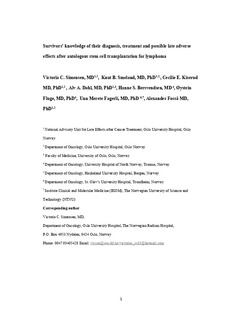| dc.contributor.author | Simensen, Victoria C. | |
| dc.contributor.author | Smeland, Knut Bjøro | |
| dc.contributor.author | Kiserud, Cecilie E. | |
| dc.contributor.author | Dahl, Alv A | |
| dc.contributor.author | Bersvendsen, Hanne Skjerven | |
| dc.contributor.author | Fluge, Øystein | |
| dc.contributor.author | Fagerli, Unn-Merete | |
| dc.contributor.author | Fosså, Alexander | |
| dc.date.accessioned | 2020-01-23T13:55:36Z | |
| dc.date.available | 2020-01-23T13:55:36Z | |
| dc.date.created | 2019-09-12T12:37:44Z | |
| dc.date.issued | 2019 | |
| dc.identifier.citation | Acta Oncologica. 2019, 58 (9), 1315-1322. | nb_NO |
| dc.identifier.issn | 0284-186X | |
| dc.identifier.uri | http://hdl.handle.net/11250/2637695 | |
| dc.description.abstract | Purpose: Lymphoma survivors after high dose therapy with autologous stem cell therapy (HD-ASCT) are at high risk for late adverse effects (AEs). Information patients receive and collect throughout their cancer trajectory about diagnosis, treatment schedule and risks of AEs may influence attitudes and health-related behavior in the years after treatment. The purpose of this study was to explore level of knowledge in lymphoma survivors after HD-ASCT at a median of 12 years after primary diagnosis.
Material and methods: From a national study on the effects of HD-ASCT for lymphomas, 269 survivors met for an outpatient examination, including a structured interview addressing knowledge about diagnosis and treatment. Survivors were also asked whether they knew and/or had experienced certain common late AEs. Numbers of recognized and experienced late AEs were presented as sum scores. Factors associated with the level of knowledge of late AEs were analyzed by linear regression analysis.
Results: Eighty-one percent of the survivors knew their diagnosis, 99% knew the components of HD-ASCT and 97% correctly recalled having had radiotherapy. Ninety percent reported awareness of late AEs, but the level of knowledge and personal experience with specified AEs varied. Thirty-five percent of survivors stated to have received follow-up for late AEs. In multivariable analysis younger age at diagnosis, having received mediastinal radiotherapy, higher mental health related quality of life, a higher number of self-experienced late AEs and having received follow-up care for late AEs were significantly associated with a higher level of knowledge of AEs.
Conclusion: The majority of lymphoma survivors treated with HD-ASCT correctly recalled diagnosis and treatment, while knowledge of late AEs varied. Our findings point to information deficits in survivors at older age and with lower mental health related quality of life. They indicate benefit of follow-up to enhance education on late AEs in lymphoma survivors. | nb_NO |
| dc.language.iso | eng | nb_NO |
| dc.publisher | Taylor & Francis | nb_NO |
| dc.title | Survivors' knowledge of their diagnosis, treatment and possible late adverse effects after autologous stem cell transplantation for lymphoma | nb_NO |
| dc.type | Journal article | nb_NO |
| dc.type | Peer reviewed | nb_NO |
| dc.description.version | acceptedVersion | nb_NO |
| dc.source.pagenumber | 1315-1322 | nb_NO |
| dc.source.volume | 58 | nb_NO |
| dc.source.journal | Acta Oncologica | nb_NO |
| dc.source.issue | 9 | nb_NO |
| dc.identifier.doi | 10.1080/0284186X.2019.1637538 | |
| dc.identifier.cristin | 1723949 | |
| dc.description.localcode | Locked until 9.7.2020 due to copyright restrictions. This is an [Accepted Manuscript] of an article published by Taylor & Francis, available at https://doi.org/10.1080/0284186X.2019.1637538 | nb_NO |
| cristin.unitcode | 194,65,15,0 | |
| cristin.unitcode | 1920,12,0,0 | |
| cristin.unitname | Institutt for klinisk og molekylær medisin | |
| cristin.unitname | Kreftklinikken | |
| cristin.ispublished | true | |
| cristin.fulltext | postprint | |
| cristin.qualitycode | 1 | |
